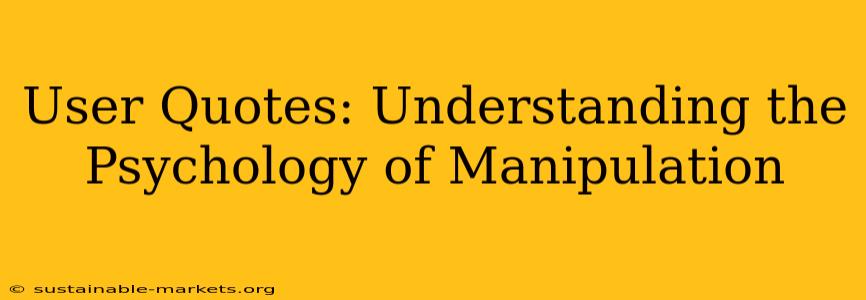User quotes, those snippets of text contributed by individuals within online platforms, offer a fascinating window into human psychology. While often seemingly innocuous, a closer examination reveals how user quotes can be strategically manipulated, both intentionally and unintentionally, influencing opinions and behaviors. This exploration delves into the psychology behind this manipulation, examining the techniques employed and the impact they have on individuals and online communities.
What are User Quotes and Why are they Important?
User quotes, whether on social media, review sites, forums, or even in online games, are brief statements expressing an individual's opinion, experience, or emotion. These quotes can significantly influence how others perceive a product, service, brand, or even a particular viewpoint. Their importance stems from their perceived authenticity. Unlike polished marketing copy, user quotes often feel genuine, relatable, and trustworthy, making them particularly impactful.
How are User Quotes Manipulated?
The manipulation of user quotes can take many forms, often subtle and difficult to detect. Understanding these methods is crucial to critically evaluating the information we encounter online.
Astroturfing:
This technique involves creating fake user quotes to artificially inflate positive reviews or suppress negative ones. Companies might employ social media bots or paid individuals to generate positive comments, giving a false sense of widespread approval. This is a deliberate form of manipulation designed to mislead consumers.
Selective Quoting:
This involves taking a user's quote out of context to distort its original meaning. A longer, nuanced comment might be truncated to emphasize only a specific, favorable or unfavorable, aspect. This manipulation relies on the audience's limited exposure to the complete statement.
Emotional Appeals:
User quotes frequently leverage strong emotions like anger, joy, or fear. Manipulators might strategically highlight quotes that elicit specific emotional responses to sway public opinion. A string of highly emotional, albeit potentially biased, comments can create a sense of urgency or consensus.
Bandwagon Effect:
The sheer volume of user quotes can create a "bandwagon effect." Seeing many people express a similar opinion can influence individuals to adopt that same perspective, even if they haven't critically examined the evidence. This plays on the human desire to conform and belong.
How Can I Identify Manipulated User Quotes?
Recognizing manipulated user quotes requires critical thinking and careful scrutiny. Here are some key considerations:
- Look for inconsistencies: Do the quotes align with other information you've seen? Are there any red flags, such as overly enthusiastic or overly negative comments?
- Check the source: Is the platform known for authentic reviews, or is it susceptible to manipulation? Consider the platform's reputation and its mechanisms for verifying user authenticity.
- Consider the context: Is the quote presented in its entirety, or has it been selectively edited? Look for potential omissions or distortions.
- Look for patterns: Do numerous quotes express an identical sentiment? This could be a sign of astroturfing.
What are the Psychological Effects of Manipulated User Quotes?
The psychological impact of manipulated user quotes can be significant. Individuals can develop inaccurate beliefs, make poorly informed decisions, or feel manipulated and distrustful. The erosion of trust in online information is a serious consequence of such manipulation.
How Can We Protect Ourselves From Manipulation?
Developing media literacy skills is crucial in navigating the online world. This involves actively questioning information, cross-referencing sources, and cultivating a healthy skepticism towards overly positive or overly negative reviews. By carefully evaluating user quotes and considering their potential biases, we can better protect ourselves from manipulation and make informed choices.
This exploration of user quotes and their manipulation provides a framework for understanding the complex interplay between psychology and online information. While user quotes offer valuable insights, recognizing the potential for manipulation allows us to engage with online content more critically and responsibly.

